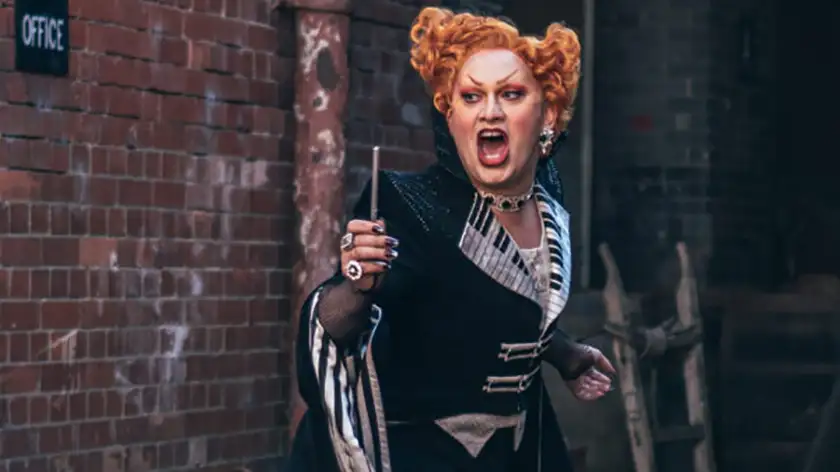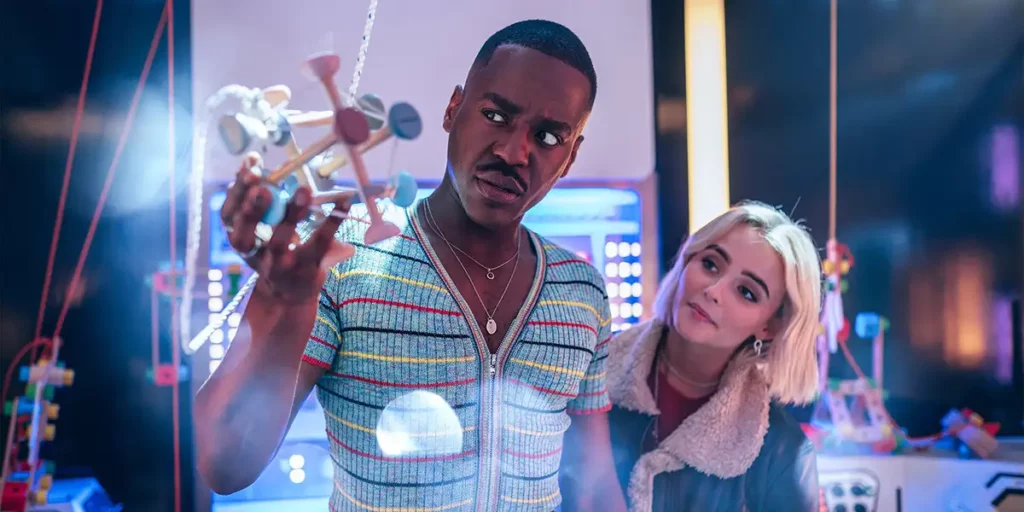The Season 1 premiere of Doctor Who (2024) does a great job of introducing new audiences to the show while keeping things fresh for returning viewers.
Showrunner: Russell T Davies
Genre: Adventure, Sci-Fi
Number of Episodes: 8
Release Date: May 10, 2024 on Disney+ where available; May 11 on BBC iPlayer (U.K.)
Where to Watch: Disney Plus
The introduction of a new era is always exciting in Doctor Who, but for long-term fans of the show, it often comes with lots of hesitation. Will it live up to expectations? Will the new cast be good? Will the stories be better? These have been the questions on everybody’s lips since Doctor Who announced it would be undergoing a ‘soft reboot’ (hence ‘Season 1’ instead of ‘Season 14’ or even ‘Season 40’ counting the classic serials).
Luckily, this new era has one major benefit that’s kept audiences optimistic despite the many changes: namely, the return of Russell T. Davies as showrunner, reprising his role from the 2005-2009 seasons of the show’s arguable ‘peak’. The writer returns with several new stories in Season 1, including the pilot episode ‘Space Babies’ and its immediate follow-up ‘The Devil’s Chord’, which open the doors to Doctor Who for a brand new audience.
In ‘Space Babies’, the Doctor (Ncuti Gatwa, of Sex Education) and Ruby Sunday (Millie Gibson, of Coronation Street) take their first journey in the TARDIS and find themselves on a distant human colony ship. The catch? All the adults have disappeared, and their genetically-manufactured babies have been left in command. And to make matters worse, the ship is being terrorised by a mysterious ‘bogeyman’ pulled from their worst nightmares. Straight away, this new season of Doctor Who proves that it’s not pulling its punches with the silly, lighthearted side of storytelling that Davies is renowned for. It comes with all the monsters, plot twists, and emotional moments that you’d expect from Doctor Who, alongside a healthy dose of jokes and banter from Ncuti Gatwa and Millie Gibson as they fall naturally into their new roles.
The pair have undeniable on-screen chemistry that’s absolutely crucial for these characters, with Gibson’s character serving as the audience’s eyes into this new world. There’s admittedly a lot of exposition squeezed into these 45 minutes, which means the main story takes a slight back seat at times, but it’s ultimately necessary to ensure that new audiences can quickly immerse themselves in this world and understand who these characters are. The episode is very clearly intended to be a ‘jumping-on point’ for viewers across the world who are only now getting access to the show, so the heavy plot-dump is ultimately inevitable if a little repetitive. That being said, this particular story was definitely the right one to include all this exposition, as the plot is pretty low-stakes and character-focused in comparison to other Doctor Who adventures.

This new era of Doctor Who has also come with an extremely noticeable budget increase thanks to the show’s contract with Disney, which has resulted in a much sharper visual style and plenty of high-level special effects that really help enhance the science-fiction elements of the show. Returning audiences might initially miss the more intimate, practical style of shooting that’s helped make Doctor Who such a beloved classic over the years, but if the rest of the season looks as crisp and creative as this pilot, it’ll be hard to complain after a while. Everything feels very fresh and new, but Davies ensures that those links to the ‘pre-reboot’ seasons are still totally clear, whether that’s through direct references to the Doctor’s previous adventures or quirks built into Gatwa’s performance that allude to previous incarnations of the character.
‘Space Babies’ might not be Doctor Who’s most memorable story in the grand scheme of things, but it’s a pretty fun introduction to the new season that gets the job done and kicks things off with a bang. The second episode, ‘The Devil’s Chord’, sees the pair travel back in time to 1960s England – more specifically, the famous Abbey Road studios where the Beatles spent the latter half of their career. But in typical Doctor Who fashion, things don’t exactly go to plan when the Doctor comes face-to-face with a new enemy who has dangerous connections to his past.
Anybody interested in musical history, and not just the Beatles, will immediately find themselves connecting with this episode simply thanks to the rich history that’s explored throughout the story. There are plenty of references to British music and even a few surprise appearances that really ground this episode in reality, but for the most part, the story is actually focused elsewhere.
‘The Devil’s Chord’ sees the introduction of a new enemy for the Doctor and Ruby in the form of Maestro (Jinkx Monsoon, of RuPaul’s Drag Race), a mysterious force that’s seemingly erased music from the world. But the character’s roots go much deeper than this episode, harking back to the Doctor’s previous adventures and sowing the seeds of a narrative thread that’s clearly going to be important in the rest of the season. It’s definitely a fun story, and there will be plenty of moments that have audiences watching their screens with huge smiles on their faces, but ‘The Devil’s Chord’ is admittedly one of those stories that’s a little difficult to fully engage with because everything is incredibly over-the-top.
The character of Maestro is extremely dramatic and flamboyant in ways that other iconic villains like The Master have tapped into previously, but it could definitely be said that it’s a little too much. The silliness does sometimes get in the way of the episode’s true stakes, and the character isn’t scary or creepy in the way that Doctor Who’s best villains are. This is something that carries through the entire episode, with the narrative often ignoring the interesting parts of this concept, such as the inclusion of the Beatles and Abbey Road studios, and sidelining them for a pretty silly story that really could’ve taken place anywhere.

That’s not to say that ‘The Devil’s Chord’ is a bad episode – far from it. There are plenty of fun moments, and the returning cast are still incredibly charming in their new roles. It just doesn’t have the emotional weight or high stakes that are so necessary when the season is only going to be eight episodes long. Doctor Who has always been composed of longer-format seasons, so with this major reduction for the ‘reboot’, it really doesn’t feel like there’s time to spare for episodes that don’t fully take advantage of their creativity.
These first two episodes of the season have both been fun, but it doesn’t feel like this new era of Doctor Who has fully established itself in any kind of dramatic way yet. This could definitely change in the later episodes, or maybe the show is just going for a totally different style, but that could easily alienate some long-term fans who’ve always stuck around for the creepy, well-plotted sci-fi aspects of the show rather than the purely comedic stories. However, there are still six episodes remaining in Season 1, and if there’s one thing that Russell T. Davies has proven in the past, it’s that he knows how to pull everything together in the end.
Season 1 of Doctor Who (2024) will be released on Friday, May 10 at 7:00 p.m. ET on Disney+ where available, and simultaneously on May 11 at midnight on BBC iPlayer in the U.K. New episodes debut weekly.

